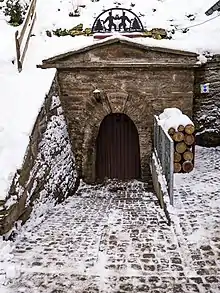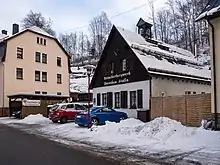Dorothea-Stolln
The Dorothea-Stolln, also known as Himmlisch Heer Fundgrube Dorothea, is a former underground mine in Cunersdorf near of Annaberg-Buchholz in Germany. Today, it is a visitor mine with a length of 53 km and a constant temperature of 8 °C. The Upper Saxon word Stolln means an adit, the German word Fundgrube was used to describe the pit that was the first to be awarded on a newly discovered field.[1]

History

In the 16th century, mining activities in Cunersdorf started. Due to the hihg yields, the mine quickly gained popularity. As of 1536, they earned 2409 Guldengroschen per Kux (non-material shares of a mine) in 2 and a quarter years. This was mainly due to a high concentration of silver (up to 40 %) in a lode. However, yields fell again in the following years.[2] During the construction of an shaft, the year 1551 was discovered 125 m below the ground.[3] The entrance that is still used today was constructed in 1853.[4] The mining started with silver ore, later, also nickel, copper, uranium and cobalt ore was obtained.[3] After World War II, in 1946/47, the SAG Wismut began searching for uranium in Annaberg-Buchholz, also in the Dorothea-Stolln. Uranium mining lasted only a short time and ended in 1958.[5]
Visitor mine
.jpg.webp)
Since 1994, the Dorothea-Stolln can be visited.[1] The visitor mine is operated by the association IG Altbergbau Dorotheastollen Cunersdorf e.V.[6] A special feature is the guided tour with a boat ride, where visitors can travel a 250-meter route in the mine by boat.[1]
References
- "Glück Auf im Besucherbergwerk Dorothea-Stollen". 2012. Retrieved 2023-01-26.
- Müller, Herrmann (1894). Die Erzgänge des Annaberger Bergreviers (PDF) (in German). Leipzig: W.Engelmann. p. 9.
- "Zur Geschichte". Dorthea-Stolln. Retrieved 2023-01-26.
- "Kulturdenkmale im Freistaat Sachsen - Denkmaldokument". Saxony State Office for the Preservation of Monuments. Retrieved 2023-01-26.
- "Sanierung Halde Dorothea Stolln". Wismut GmbH. Retrieved 2023-01-26.
- "Impressum". Dorothea-Stolln. Retrieved 2023-01-26.